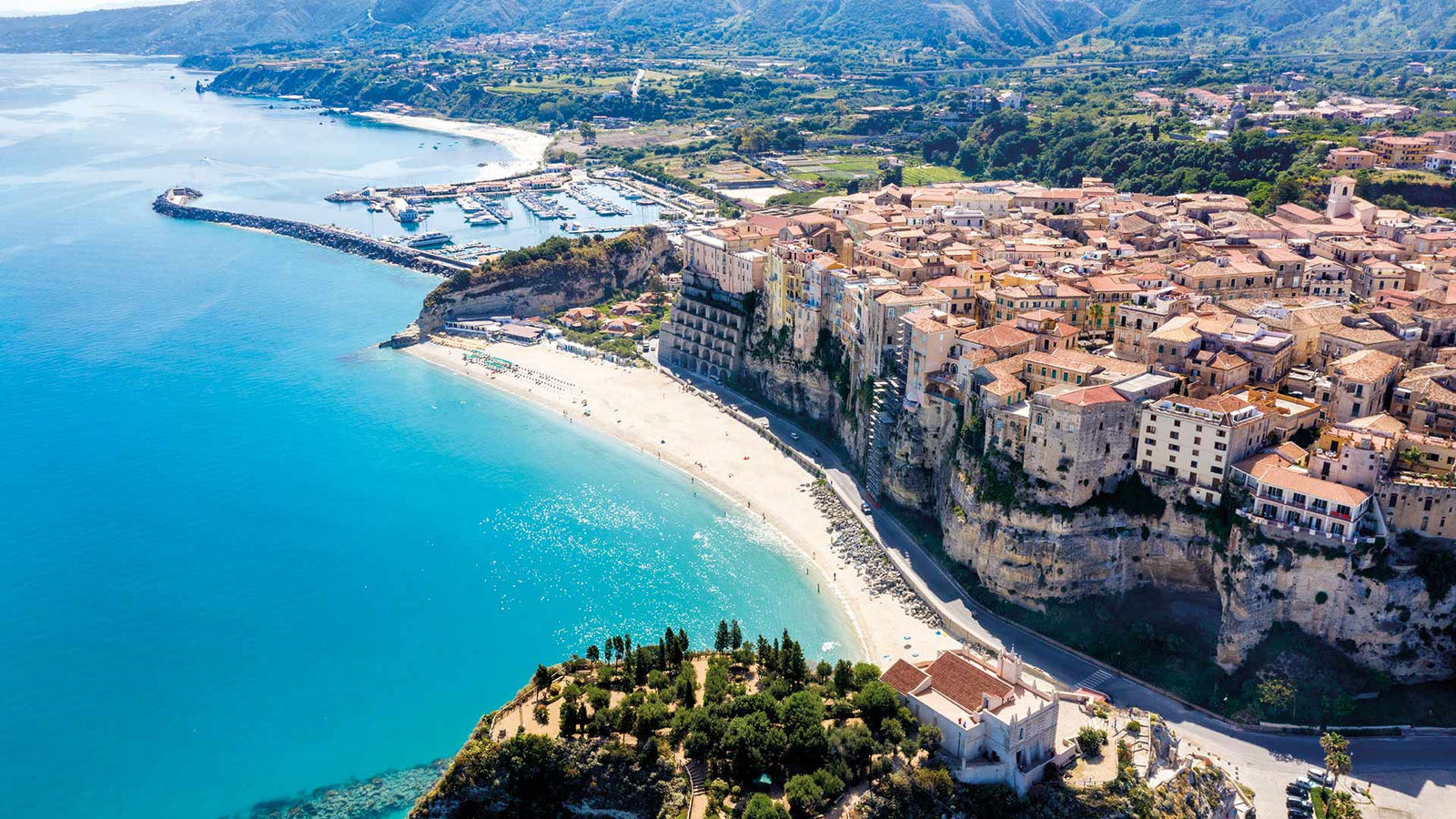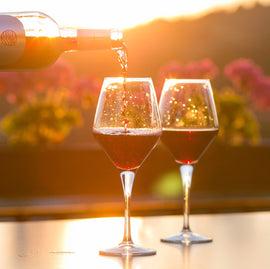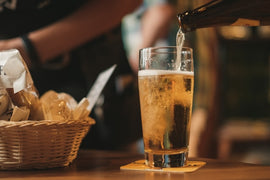Calabria
In June we landed in Lombardy, at the north most edge of Italy’s massive Apennine Mountains. This month we are following the range’s progress some 870 miles south, down the spine of the entire peninsula, to where it comes to a stop in Calabria. The southernmost region in mainland Italy, less than two nautical miles from Sicily, and the sharp tip of Italy’s boot, Calabria is rugged, ancient and complex. It encompasses mountains and alpine forests in the interior and gorgeous beaches and dramatic sea cliffs crowned by psychedelic rock formations along the coast. It is home to the Reggio Calabria National Museum, one of Italy’s most famous, which documents one of the longest continuous human presence on the peninsula, dating back some 30,000 years. And the region’s winemaking tradition is only slightly more recent: by the time the Greeks showed up around the 7th and 8th centuries BC, the local oeno scene was already vibrant enough for them to dub the place Enotria or, “land of wine.” The Greeks then brought over their own vines, and the Romans who followed helped to graft viticulture into regional farming activities. Wine has thus been part of every local crop grower’s daily ritual for millenia, and today Calabria has over 250 indigenous grape varietals thriving on specific soils in diverse microclimates - the most notable being Gaglioppo, Magliocco, Magliocco Canino, Greco Nero, Nerello Cappuccio, Nocera for the reds and Greco Bianco, Guarnaccia, Insolia, Montonico for the whites.
And yet, Calabria is still relatively isolated and remote, the most rural and least industrial part of Italy, responsible for less commercially produced wine than almost any other region. This is due partly to geography - the rough coastline and mountainous interior made it difficult for mass industry to take hold - and also the lamentable history of poverty, corruption and resultant population drain Calabria shares with other areas of the Italian South. Presently, there are about 11,000 hectares of vineyards in Calabria, with 12 DOCs, mostly concentrated in the provinces of Crotone, Cosenza, Catanzaro, and Reggio Calabria. The most well-known and regarded Calabrian wines are reds from the Cirò DOC, located in eastern foothills of the La Sila plateau and out to the Ionian coast, which must consist of at least 80% Gagglioppo. Perhaps the oldest extant wine in Italy, Cirò (then known as Krimisa) is said to have been used as a celebration toast by Calabrian athletes in the early Olympics.
In general, Calabrian wines have the reputation of underachievers, rarely living up to the potential of the soil from which they spring. As with other parts of the winemaking world, this is changing, slowly but surely, as local vintners young and old choose to focus on small yields, sustainable farming practices, and the preservation of the specifically local viticultural identity that has survived here for so long. The white is a Greco Bianco from Casa Comerci, a family winery farming organically in the Vibo Valentia province, underneath Mount Poro, and in sight of Sicily and the Aeolian Islands. The red is a blend of 70% Gaglioppo,15% Malvasia Nera and 15% Greco Nero from Du Cropio, one of the great wineries in Cirò, and is certified organic as well.
Salut,
Alan Hicks -Wine Buyer - Noe Valley
|
Casa Comerci Refulu-Greco Bianco 2021 |
|
|
Region: Limbadi, Vibo Valentia, Calabria, Italy
|
About the Winery: Francesco Comerci founded Casa Comerci in 1880, passing it on to his daughters Michelina and especially Rosina, the latter of whom married Domenicoantonio Silipo, the local cooper. Together they had seven children. The youngest, Salvatore, born a few months before her husband's death, became a lawyer in Emilia Romagna, but returned for every harvest. In the early 2000s, Salvatore's son, Domenicoantonio, decided to rebuild the company, building a new wine cellar and purchasing another 15 hectares of land, in addition to replanting new plants of Magliocco Canino in the historic 2 hectare vineyard located just below the cellar. The vineyards planted to Magliocco Canico and Greco Bianco are cultivated organically on sandy soils. In the cellar the vinification is spontaneous with the only indigenous yeasts. Today, Casa Comerci covers an area of 30 hectares, in which, vineyards occupy 15 hectares, and the remaining space is dedicated to an olive grove. About the Winemaking: Rèfulu (which in Calabrian dialect means "sigh of the wind") is 100% Greco Bianco grapes that come from vineyards grown organically on sandy and silty soils. Crushing and destemming and soft pressing and subsequent fermentation at a controlled temperature of 21 ° C conducted by the yeasts naturally present on the grapes. Maturation in stainless steel for about 8 months and refinement in bottle for 2 months. Tasting Notes: Attractive aromatics characterized by yellow flowers, honey, herbs, sage, rosemary and yellow citrus fruits. Fairly rich in the mouth, with great balance between acidity, minerality and body. |
|
Winemakers: Rosa Comerci
|
|
|
Price per bottle / Price per case $26 $280.8 |
|
|
Suggested Food Pairing: grilled swordfish, shellfish; fried anchovies; eggplant grilled marinated with garlic and mint; fresh pecorino cheese.
|
|
|
Du Cropio Serre Sanguigna Calabria Rosso 2016 |
|
|
Region: Ciro Marina, Calabria, Italy
|
About the Winery: Giuseppe Ippolito is considered the father of nouvelle vogue Calabrian wines. Du Cropio in local dialect means “doctor of agronomy” and reflects the fact that the Ippolito family has long been involved in the growing of regional grapes. His estate lies on the hilly slopes of Ciro’ Marina, facing the Ionian Sea, in the province of Crotone. 30 hectares planted only with the red varietals: Gaglioppo, Malvasia Nera and Greco Nero. The soil, a mix of clay and limestone, is poor but has excellent drainage, reinforced by the steeply sloped hillside vineyards. The conditions are ideal for producing small crops of highly concentrated fruit. Giuseppe produces only three reds: Serra Sanguigna (Calabria Rosso), Dom Giuva’ (Ciro’) and Damis (Ciro’ Riserva). Serra Sanguigna is the name of a prime zone in the interior of the Ciro appellation that is not only particularly beautiful but is responsible for producing classic wines of the appellation. The hillside vineyards are planted to a mix of Gaglioppo, Malvasia Nera and Greco Nero and from there, on a clear day, one can see the entire Gulf of Taranto to the north and the Capocolonna promontory to the south. About the Winemaking: The vineyards are cultivated with organic principles, even using horses to plow through the rows of vines. The “Serra Sanguigna'' is generally composed of 70% Gaglioppo, 15% Malvasia Nera and 15% Greco Nero. Harvested manually from 35-40-year-old vines usually in early October. After sorting, destemming, and crushing, the wine ferments with cultured yeasts in stainless-steel tanks and spends 7-8 on lees and 15-20 months in neutral botti. The wines are not filtered or fined to preserve the integrity of the fruits. Tasting Notes: Serra Sanguigna is the name of a prime zone in the interior of the Cirò appellation that is not only particularly beautiful but is responsible for producing classic wines of the appellation. It is the most rustic wine of the estate marked by a powerful plum-infused fruit, robust in weight, deep ruby in color, and surprisingly lithe on the palate. An age-worthy wine, 2016 is the current vintage. |
|
Winemaker: Giuseppe Ippolito
|
|
|
Price per bottle / Price per case $25 $270 |
|
|
Suggested food pairing: Grilled pork chops; lasagna with meatballs and ricotta, wild boar Calabria-style; Fileja Tropeana (see recipe)
|
|
Fileja Tropeana: This is a great, hearty and versatile Calabrian pasta featuring Cipolla rossa di Tropea, the sweet red onion that is perhaps the region’s most famous agricultural export, and Fileja, a Calabrian pasta, similar to Fusilli, but more elongated. (Fusilli will totally work in a pinch though.) You can keep it vegetarian (and add dried porcini mushrooms if you like – just make sure to soak them for 20-30 minutes in warm water first) or make it with Italian sausage like Sopressata or Nduja (a spicy Calabrian pork sausage). Calabrians tend to like their food pretty spicy but if you prefer it with less heat, feel free to choose a milder sausage or use less peperoncino.
Ingredients:
350 g fileja (12oz) or fusilli 30 g Parmigiano Reggiano (1oz) grated
3 zucchini 1/2 Tropea onion peeled and finely sliced
1-2 eggplants 8-10 cherry tomatoes cut in half
3 tbsp extra virgin olive oil salt for the pasta and to taste
1 handful basil leaves chopped 1/2 red chili (peperoncino) chopped (or 1 tsp dried flakes)
Directions:
- Wash and trim the zucchini and eggplant and cut into small chunks. Peel and finely chop the onion. Wash and cut the cherry tomatoes in half. If using, remove the seeds from the peperoncino and cut into very small pieces.
- Put a pot of water on to boil for the pasta. Add salt when it starts to boil and bring to the boil again.
- In a frying pan or skillet, fry the finely sliced onion in the olive oil.
- Add the zucchini and the eggplant and sauté over medium heat until they start to soften slightly.
- Add the cherry tomato halves and the finely chopped chili. Continue to cook for 5-10 minutes. The vegetables should remain crunchy.
- Finally add the handful of chopped basil.
- Cook the fileja al dente according to the instructions on the packet in the boiling salted water. When the pasta is ready save some of the cooking water, drain the pasta and add to the pan with the sauce.
- Stir the pasta and sauce together on the stove with some tablespoons of cooking water from the pasta and grated Parmigiano cheese.
- Serve hot with extra grated Parmigiano as required.





